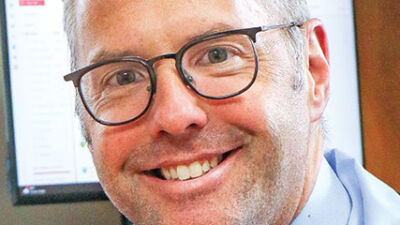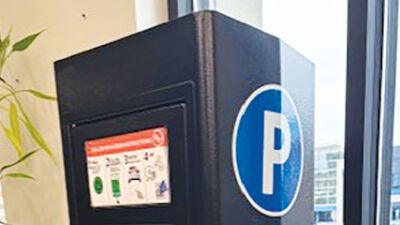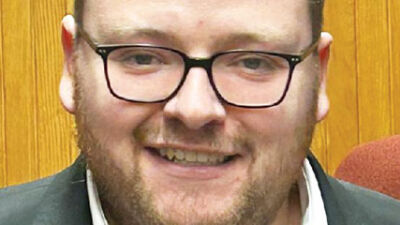
Rabideau was diagnosed with stage 3 inflammatory breast cancer a couple of months after she gave birth to her daughter, Tatum.
Photo by Jackie Best Photography
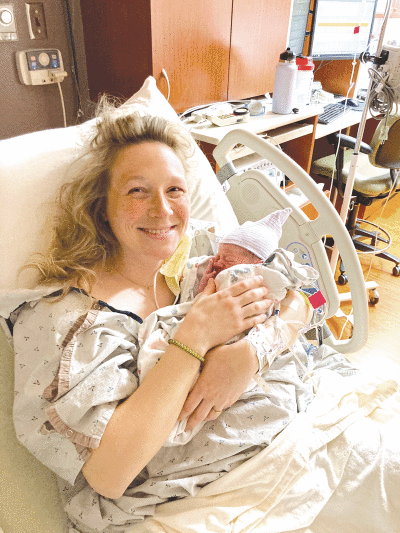
Ellen Rabideau gave birth to her daughter, Tatum, on May 9, 2021, which coincidentally also was Mother’s Day.
Photo provided by Ellen Rabideau
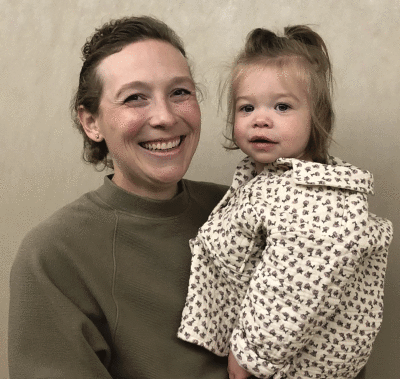
Rabideau credits her daughter, Tatum, for helping her discover she had breast cancer.
Photo by Mike Koury
ROYAL OAK — On May 9, 2021, Ellen Rabideau gave birth to her baby girl, Tatum, on a very special Mother’s Day.
It only was a couple of months later, in July, that Rabideau’s life changed completely when she received a stage 3 inflammatory breast cancer diagnosis.
Before her diagnosis, Rabideau, 31, always had taken steps to screen for cancer due to her family history. Two of her aunts died after battles with the disease. So since she was 18, Rabideau has received routine screenings for cancer. Her last screening had come in February while she was pregnant, which came back clean.
It wasn’t until Rabideau, a Royal Oak resident, tried to breastfeed that she noticed that something was wrong.
“I tried to breastfeed, which was a huge struggle,” she said. “(Tatum) would never latch and so I ended up deciding to stop because it just wasn’t working. And in the process of stopping, my right breast swelled and got what looked like an infection called ‘mastitis’ that a lot of women experience. The thing about inflammatory breast cancer is it looks just like mastitis. There is no lump to be felt.”
At her six-week postpartum checkup, Rabideau’s gynecologist checked to see if the issue was an abscess or a more serious infection. It was then that doctors discovered it was not an infection, but inflammatory breast cancer.
Rabideau said she felt “totally lost” when she got her diagnosis.
“I am a first-time mom,” she said. “I have no idea what I’m doing. I’m trying to raise this baby. My husband (Zach) had gone back to work. I was in a lot of pain. That was probably the biggest thing, is I was so uncomfortable. And so trying to hold a baby while I’m having to take these pain medications, go for all of these tests and try to stay calm, all the meanwhile really being terrified that I’m gonna die before my daughter reaches her first birthday.”
Though the diagnosis was scary, Rabideau also found peace of mind as she and her family figured out what was wrong with her and could move forward in finding help.
Six days after learning she had breast cancer, Rabideau was in chemotherapy and began an immunotherapy drug called Keytruda. She would be on both for the next five months. Her cancer, already in stage 3, had invaded her lymph nodes and needed aggressive treatment quickly.
During this time, Zach, who is a nurse, was her primary caregiver. The two also made the decision to move themselves and Tatum in with her parents, her sister and her sister’s boyfriend so everyone could help with raising her daughter. When receiving chemotherapy, it would be around five days before Rabideau could take care of her daughter.
“It was really hard to let other people take care of my baby, even though it was my family and I knew they were doing a great job,” she said. “It was hard not to be her primary person.”
Nayana Dekhne, a breast surgeon with Beaumont Hospital, has worked with Rabideau and her family over the years, including one of Rabideau’s aunts.
Dekhne said she met Rabideau before her cancer diagnosis, after she found out she carried the BRCA gene mutation, and they talked about risk management, as they knew she was at high risk.
When Dekhne heard about what Rabideau had been going through, knowing her family history, she wanted her to get tested quickly to confirm a diagnosis.
“Right away, we knew we had to get her treated,” she said. “When I walked into her room, you have to realize if you know her family history, she has seen several generations of her family go through this and have bad outcomes. And how do you go into a room, you know, somebody who’s just had a baby in their 20s, and tell them, ‘Well, this is the same problem.’ This is where science and research that’s happening in breast cancer is so exciting.”
Dekhne said her mission when walking into the room to talk about Rabideau’s cancer diagnosis was to give her hope and show her that she has options with the advancements in health.
“I said, ‘Ellen, we’re going to change the history of your cancer here. We have different options that nobody in your family had. We need you to get through this and we have a targeted agent,’” she said.
In January, Rabideau underwent a double mastectomy with a lymphovenous bypass. What followed was six weeks of proton radiation at Beaumont, and, in April, she started a drug called olaparib, which she will take for a year, that’s specifically for patients with the BRCA gene mutation.
After months of living with her family, the Rabideaus were able to move back into their home in May. Her husband has returned to work, and Tatum has entered toddlerhood, where her personality has started to show.
“It’s amazing that I get to be here to watch her grow up, because there was a time when I didn’t think that was gonna be possible,” she said.
Rabideau currently is in remission with her cancer and she gets scanned every six weeks, with her next one scheduled for December.
Speaking to the Woodward Talk in October during Breast Cancer Awareness Month, Rabideau said it’s weird to be in the month as a survivor, but she feels passionate about awareness for breast cancer, specifically inflammatory breast cancer, because of its rareness.
“More important than pink ribbons is funding organizations that are really focused on research for stage 4 metastatic breast cancer,” she said. “I’m lucky to be a survivor, and not everyone gets to be there to hold their kids. And so I hope that this month reminds people that when you’re thinking about donating to places, choose those that are really focused on survival and finding a cure for this disease.”
For everything Rabideau has gone through, from learning about her cancer diagnosis soon after giving birth to fighting the disease over the last year and a half, Dekhne called her an inspiration.
“Can you imagine being in your 20s going through a pregnancy, seeing all your family members go through horrific, you know, ends because of the treatment, and to find out that we have a 6-week-old and now you’ve been diagnosed with cancer?” she said. “I was worried about her doing (these interviews), and I had a third person call her to see if she’s OK with really doing this. And she said she wanted to get the message out. She wanted everybody to know if they have a family history, if this is what they are going through … she is an inspiration.”
Thinking back to when Tatum wasn’t latching onto her breast, Rabideau referred to this moment as a gift that her daughter gave her, as it would lead to learning about her illness.
“My doctors are phenomenal, and they gave me every treatment that saved my life, but Tatum not latching at birth and coming early, I think she was really the one who knew something was going on and helped us get that diagnosis that saved my life,” she said. “I can’t imagine where I would be without her.”
 Publication select ▼
Publication select ▼

